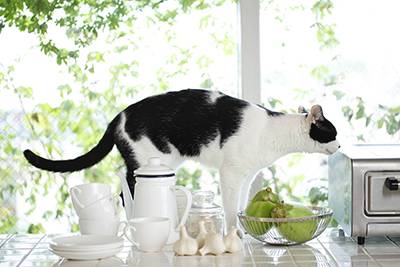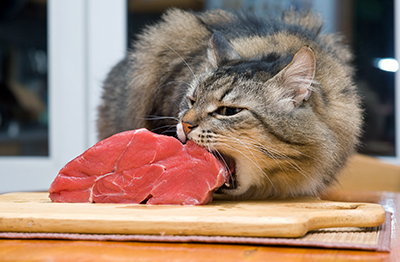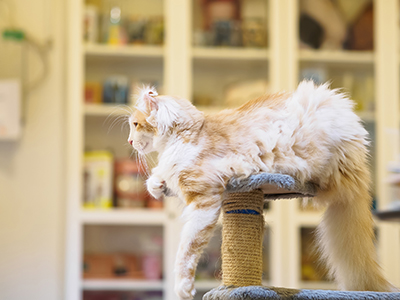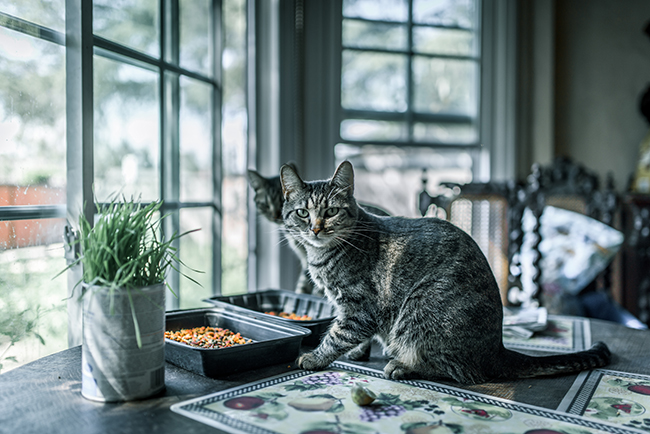No one likes to find cat hair in their food.
One of the more common complaints I hear from owners is how their cats won’t stay off the countertops. I get it, I really do. It’s an annoying habit for those of us who enjoy cooking or using the countertop as a dining area. Fortunately, there are simple ways to keep your cats off of the counters. Let’s start with the most obvious.
Read more about our unique Cat Training course.
Don’t Feed Your Cat on the Counter

©kazoka303030/Adobe Stock
I once had a friend who complained about her cats on the counters, but then fed her cats on them. I asked why she would enforce the behavior she doesn’t want and she replied that her dogs got into the cat food, so there was no choice.
There’s always a choice. Don’t ask your cats to do something that you will eventually not want them to do. The good news is we were able to curb both her and the cats’ behavior simply by feeding the cats in a room the dogs couldn’t access. Happy cats, happy owners, happy dogs.
Provide an Alternative
The next easiest way to keep your cats off countertops is to give them an alternative. Remember that cats like to observe from elevated surfaces, hence the counters—they are up high (which allows your cat to safely watch her territory), they are fun to walk on (and there are often papers there that they can sit on), and the counter is used for cooking (which means they can usually find food).
If you want your cat off the counter, you’re going to need to provide an appealing alternative to them. This could include access a cat tower, bar stool, wall shelf or window perch that she can use to look down on you while you using the counter. The idea is that is you need to make a different area more appealing to your cat.
Treats and Toys

©darkbird/Adobe Stock
Cats can be just as responsive to treats as dogs are, but it’s critical you find the most appealing. My cats love things like chicken or salmon, other cats might be more likely to behave for sardines or a favorite toy. When you sense your cat is preparing to make his assent to the counter, quickly distract him with a treat or toy. This is a reward for good behavior.
Timing is critical or you will inadvertently reward your cat for climbing on the counter. It can be tricky and it might take several months of treating good behavior, but your cat will eventually understand that it’s to her benefit to stay off the countertops.
Repellants
Did you know that when children visit the doctor, many prefer having a nurse take them into the exam room while the parents wait outside? That’s because they don’t want their kids to relate them to the unpleasant experience. The same premise holds true for cats. Cats might react badly if you punish them, and it could even result in unwanted behaviors, such as spraying or becoming fearful of you.
This is why if you ever need to use a repellant, you want the cat to think some higher power is associated with it, not you. In addition, these types of repellents (i.e., environmental punishments) can be effective even if you are not there. Some of these options include:
- Aluminum foil: Most cats don’t like the feel of aluminum foil on their paws or the sound it makes when it’s moved. This, however, means keeping your counters covered with aluminum foil when you’re away as well as when you’re home.
- Ssscat™ Motion Activated Detector: These detect motion and release harmless air from a canister. The pros—it’s super effective. The cons: It can also seriously scare your cat, causing her to fear the entire room. Never use this device or a similar one around cats who are naturally shy or fearful. In addition, you will also get scared when you accidentally set it off (and you will set it off at some point).
- The Snappy™ Trainer: This is a large plastic paddle attached to an upside-down mousetrap. You can use it as is, or you can place it under a sheet of newspaper. Even the smallest touch will activate the Snappy Trainer. Once triggered, the device flies up in the air and startles the cat. The device is safe and mostly effective, but again you run the risk of creating fear in your cat.
- Sticky tape: Cats don’t like being stuck to things any more than we do. That’s what makes double-sided sticky tape effective. Place it on the edge of your counters and your cat will likely stay off of them. Down side includes replacement time and getting stuck on it yourself. Depending on your cat, you might need to apply it to the countertop surface.
Don’t Reward Them for Jumping on the Counter

©wanlopn/Adobe Stock
We all do it. The cat jumps up on the counter and takes a drink out of the running faucet and we run for our cameras. Or we pet them before removing them from the counter. Or we leave food on the counter and they grab a quick bite of fresh salmon. The problem with these scenarios is that your cat is being rewarded for unwanted behavior.
Don’t forget that negative attention can often be positive to a cat who doesn’t get enough attention overall. If your cat only receives attention when she climbs up on a counter—by you yelling at her or picking her up and placing her on the floor— it’s still attention in the mind of an animal (or human) who is constantly ignored. Make sure you’re spending enough time with your cat during the day, including providing plenty of playtime, cuddles, brushes and love. As much as cats like us to think they are independent and don’t need us, they have high requirements for love and attention.





